| |
 |
Luteists, composers, associates |
 |
| Modern players on early instruments, associates |
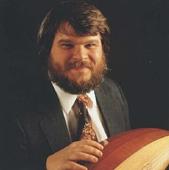 Paul R. O'Dette Paul R. O'Dette
(b. Columbus, Ohio, February 2, 1954) is an American lutenist, conductor, and music researcher specializing in early music.
O'Dette began playing classical guitar, and while in high school also played electric guitar in a rock band in Columbus, Ohio, where he grew up. He eventually adopted the lute (as well as the related archlute, theorbo, and Baroque mandolin) as his primary instruments, and primarily specializes in the performance of Renaissance and Baroque music.
Since 1976, he has served as Professor of Lute and Director of Early Music at the Eastman School of Music in New York. He lives in Rochester, New York with his wife, son and daughter. |
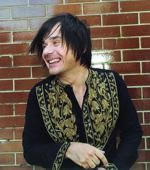 Edin Karamazov Edin Karamazov
is a Bosnian/Croatian musician-lutenist (born in 1965 in Zenica, Bosnia and Herzegovina) and lives in Croatia. He studied lute with Hopkinson Smith at the Schola Cantorum Basiliensis and worked with such ensembles as Hesperion, L'Arpeggiata, Hilliard Ensemble, Mala Punica, Orpheus Chamber Orchestra and singers Andreas Scholl, Maria-Cristina Kiehr, Arianna Savall, and Sting. Karamazov's solo archlute recording features Benjamin Britten's "Nocturnal" and J.S.Bach's Partita in d-minor (orig. for violin). Recent collaborations with Sting (in the field of 16th century music) resulted in the album and film Songs from the Labyrinth, devoted to the lute-songs of John Dowland.
Karamazov's 2008 solo CD project on DECCA "The Lute is a Song" includes guest appearances of Renee Fleming and Macedonian singer and songwriter Kaliopi. |
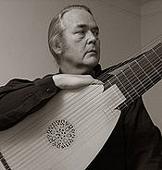 Robert Barto Robert Barto
(born in San Diego in 195?) is an American lutenist specializing in the music of the Baroque and Empfindsamkeit periods, in particular the oeuvres of Sylvius Leopold Weiss and Bernhard Joachim Hagen. He is a graduate of the University of California, San Diego, having majored in historical lute performance. The recipient of a Fullbright scholarship, he continued his studies in Cologne, Germany and Basel, Switzerland with Michael Schaeffer and Eugen Müller-Dombois, respectively. Having made Germany his home for many years, he travels and performs throughout the world.
In 1984, Barto took top honors at the "International Lute Competition" in Toronto and the "Musica Antiqua Competition" in Bruges, Belgium. His performances of note have included solo recitals at the Festival of Flanders, London's Purcell Room, the Utrecht Festival, and in New York City's "Music Before 1800" event. In 2000, Barto performed a tribute to Sylvius Leopold Weiss in Dresden. He also gave solo recitals for Bavarian Radio's "Bach Night" in Munich as well as the "Lufthansa Baroque Festival" also held in London.
He is greatly sought after as a teacher, having given master classes in Spain, Sweden, Germany, Italy and Japan. He has regularly been on the faculty of the Lute Society of America's Summer Seminar series.
Barto has recorded nine volumes of lute sonatas by baroque lutenist-composer Sylvius Leopold Weiss and two CDs of the solo works of Bernhard Joachim Hagen for the Naxos and Symphonia labels. |
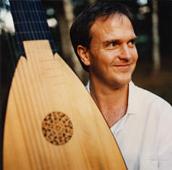 Jakob Lindberg Jakob Lindberg
Born: October 16, 1952 - Djursholm, Sweden.
The Swedish lutenist, Jakob Lindberg, developed his first passionate interest in music through the Beatles. He started to play the guitar and soon became interested in the classical repertoire. From the age of 14 he studied with Jörgen Rörby who also gave him his first tuition on the lute. After reading music at Stockholm University he went to London to study at the Royal College of Music. Here he further developed his knowledge of the lute repertoire under the guidance of Diana Poulton and decided towards the end of his studies to concentrate on Renaissance and Baroque music.
Jakob Lindberg is now one of the most prolific performers in this field. He has made numerous recordings for BIS, many of which are pioneering in that they present a wide range of music on CD for the first time. He has brought Scottish lute music to public attention, he has demonstrated the beauty of the Italian repertoire for chitarrone and he has recorded chamber music by Vivaldi, Haydn and Boccherini on period instruments. He is the first lutenist to have recorded the complete solo lute music by John Dowland and his recording of J.S. Bach's music for solo lute is considered to be one of the most important readings of these works.
Jakob Lindberg is an active continuo player on the theorbo and arch lute and has worked with many well known English ensembles including The English Concert, Taverner Choir, The Purcell Quartet, Monteverdi Choir, Chiaroscuro, The Orchestra of the Age of Enlightenment and The Academy of Ancient Music. He is also in demand as an accompanist and has given recitals with Emma Kirkby, Anne Sofie von Otter, Nigel Rogers and Ian Partridge. He assisted Andrew Parrott in the musical direction of Purcell's Dido and Aeneas given by The Royal Swedish Opera at Drottningholm Court Theatre in 1995. He also directed from the chitarrone the much acclaimed performances of Jacopo Peri's Euridice given there in 1997.
It is particularly through his live solo performances that he has become known as one of the finest lutenists in the world today; Jakob Lindberg has given recitals in many parts of Europe, Japan, Mexico, Russia, Australia, Canada and the USA. Jakob Lindberg also teaches at the Royal College of Music in London, where he succeeded Diana Poulton as professor of lute in 1979. |
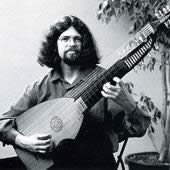 Lutz Kirchhof Lutz Kirchhof
(born 1953, Frankfurt am Main) is a German lutenist.
In 1996 he founded the Deutsche Lautengesellschaft (German Association for Lute). He performs in festivals all over the world, giving about a hundred concerts a year since 2002.
He performs regularly with vocalists such as Max van Egmond and Derek Lee Ragin, and numerous instrumentalists. Numerous recordings have appeared and he has recorded for Sony Classical.
|
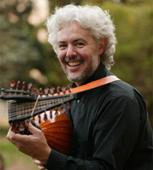 Eduardo Egüez Eduardo Egüez
(born in Buenos Aires, Argentina in 1959) is an lutenist, theorbist, and guitarist acclaimed for his interpretations of music by J.S.Bach.
He first studied guitar with Miguel Angel Girollet and Eduardo Fernández. His later studied composition at the Catholic Argentine University. In 1995 he obtained his diploma in lute performance from the Schola Cantorum Basiliensis under the tutelage of Hopkinson Smith.
Eduardo Eguez has given many solo recitals in South America, Europe, Australia, and Japan. He received awards from Promociones Musicales in Buenos Aires, 1984; Circulo Guitarristico Argentino in Buenos Aires, 1984; Concours International de Guitare in Paris (Radio France), 1986; V Concurso Internacional de Guitarra (Jacinto and Inocencio Guerrero Foundation) in Madrid, 1989.
He has also performed as a basso continuo player, as a member such ensembles as Elyma, Hesperion XXI, Ensemble Baroque de Limoges, La Grande Ecurie et la Chambre du Roi, Aurora, Concerto Italiano , Labyrinto, The Rare Fruits Council, Cafe Zimmermann, Les Sacqueboutiers, Ricercar Consort, "Stylus Phantasticus" and his own ensemble La Chimera. He has also accompanied artists such as Furio Zanasi, Emma Kirkby, Maria Cristina Kiehr, Rolf Lislevand, Victor Torres inter alia.
Eduardo Eguez has recorded for many labels: Astree Auvidis, Astree Naive, Arcana, Glossa, K617, Op 111, Alia Vox, E Lucevan le Stelle, Stradivarius, Symphonia, Alpha, Ambroisie, Naxos, Flora, Mirare, Accent, Harmonia Mundi. As a soloist he has recorded "Tombeau" with works by Silvius Leopold Weiss (E Lucevan le Stelle), the complete lute works by J.S. Bach (M.A. recordings) and "Le Maitre du Roi" with works by Robert de Visee (also M.A. recordings).
With his own Ensemble La Chimera, he has recorded for the label M.A. recordings "Buenos Aires Madrigal" (fusion of early Italian madrigals and Argentine tango) and "Tonos y Tonadas" (fusion of early Spanish "tonos humanos" and folk music from Latin America).
Eduardo Eguez teaches lute and basso continuo at the Zurich Conservatory (Switzerland). |
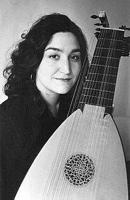 Evangelina Mascardi Evangelina Mascardi
nace en Buenos Aires Argentina en 1977.
Estudia guitarra clásica con los Maestros Gabriel Schebor y Silvia Fernandez en la Escuela Nacional de Música J.P.Esnaola donde obtiene el titulo de Maestra nacional de Música.
En 1997 se traslada a Europa para ingresar en la cátedra de laúd del Maestro Hopkinson Smith en la Schola Cantorum Basiliensis en Suiza, donde obtiene en el 2001 su Solisten Diplom.
A su vez es diplomada en laud en el conservatorio Benedetto Marcello de Venezia.
Como solista desarrolla una intensa actividad, tocando en diferentes festivales en toda Europa como: Fringe Barcelona, Musica antigua Daroca, Luht et Theorbe Ginebra, Orpheum Zurich, Concentus Brno, Old music Festival London entre otros.
Su primer disco solista para ORF Austria ha obtenido el prestigioso premio Diapason d'or otorgado por la homonima revista francesa.
Como continuista collabora regularmente con "Venice Baroque Orchestra" dir.Andrea Marcon, "Ensemble 415" dir. Chiara Banchini, "Zefiro" dir. Alfredo Bernardini, "Monteverdi Choir and Orchestra" dir. Sir John Eliot Gardiner, "Les Concert des Nations" dir. Jordi Savall entre otros.
Ha participado en producciones de opera barroca en los mas importantes teatros de Europa y America como por ejemplo : Brooklyn Academie of Music New York, Carnegie Hall New York, Theater Frankfurt, Teatre de Bodeaux, Champs Elysees, Basel Theter, Tokyo Opera Hall, Teatro colon de Buenos Aires, Taatro Ponchielli entre otros.
Ha gabado mas de veinte CD para: ORF Austria, Naive, Alpha, Sony Classical, Archiv, Ambroise, Zig-Zag territoires entre otros.
Evangelina Mascardi vive actualmente en Italia. |
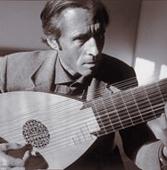 Hopkinson Smith Hopkinson Smith
(born 1946) is an American lutenist.
Born in New York, he graduated from Harvard with Honors in Music (Honors Thesis on "The pavans of Daniel Bacheler"[1]). He came to Europe in 1973 to study with Emilio Pujol, a great pedagogue in the highest Catalan artistic tradition, and also Eugen Dombois, whose sense of organic unity between performer, instrument and historical period has had a lasting effect on him.
In the mid 1970s, Hopkinson Smith was involved in the founding of the ensemble Hesperion XX and his ten year collaboration with Jordi Savall led to important experiences in chamber music which were a creative complement to his work as a soloist.
Since the mid 80s, Hopkinson Smith has focused principally on solo music for early plucked instruments. These include the vihuela, Renaissance lute, theorbo, Renaissance and Baroque guitars and the baroque lute.
With his recitals and series of over 20 solo recordings, he continues to rediscover and bring to life works that are among the most expressive and intimate in the entire domain of early music. His 2000 recording of the lute arrangements of the Bach sonatas and partitas for solo violin has been called 'arguably the best you can buy of these works – on any instrument' by Gramophone magazine.
Internationally recognized as a leading personality in the field of early music and one of the world's great lutenists, Hopkinson Smith gives concerts and master classes throughout Europe, Asia, Australia and North and South America. He currently lives in Basel, Switzerland, where he teaches at the Schola Cantorum Basiliensis. |
 Christopher Wilson Christopher Wilson
(b1951) studied the lute at the Royal College of Music in London with Diana Poulton. Since leaving he has established himself as one of the leading lutenists in Great Britain, specialising in the performance of renaissance music. He has given many broadcasts on radio and television as soloist and as an ensemble performer. His concert tours have taken him to most countries of Europe, Scandinavia, the Baltic States, Russia, Hong Kong, Japan and the U.S.A.. As well as working with Shirley Rumsey in a duo, they co-direct their own ensemble, Kithara. Christopher Wilson has performed with many of the leading early music groups and his increasing interest in the lute song repertoire has led him to work with various song recitalists.
|
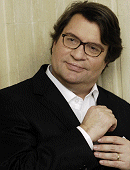 Joachim Held Joachim Held
is one of the foremost lute players of his generation. He captivates his audience with the refinement of his playing and moves the listener with expressing the different moods of the soul. In 2006 Joachim Held is the first lute player ever to receive the renowned German Echo - Klassik Award. This is in the category "Best soloist recording of the year" for his CD "Delightful Lute - Pleasure. Baroque Lute music from the lands of the Habsburgs", released by Hänssler Classic.
Joachim Held was born in Hamburg in 1963 and studied at the Schola Cantorum Basiliensis as a pupil of Eugen Dombois and Hopkinson Smith. Following the graduation with a "Diploma of Period Music" in 1988 he completed his studies under Jurgen Hubscher at the Musikhochschule Karlsruhe with a "Kunstlerische Abschlussprufung".
In 1990 the second prize at the Concours Musica Antiqua of the Flandern Festival in Brugge marked the beginning of his international concert career. Since 1992 he has regularly appeared with world famous orchestras including Il Giardino Armonico (amongst others on their Vivaldi recording with Cecialia Bartoli for Decca), the Freiburger Barockorchester, the Concentus Musicus and the Berlin Philharmonic Orchestra. Amongst the conductors he has worked are Giovanni Antonini, Claudio Abbado and Nikolaus Harnoncourt. Under Harnoncourt he also participated in the production of Herny Purcell's "King Arthur" at the Salzburg Festival 2004. As a soloist Joachim Held appeared amongst others at the Musikfestival Potsdam-Sanssouci, the International Bach Festival Schaffhausen, the Schwetzinger Festival, the Dusseldorfer Bachtagen, the Bachtage Kothen, the Concerti a San Maurizio in Milan, the Early Music Forum Budapest, the concert series "Hausmusik" of the ORF Vienna, the Lute Society London, the Guldenen Herbst" in Thuringen and the Handel Festival in Halle at the river Saale.
Joachim Held's recordings show a lute player who combines technical perfection with an extraordinary power of imagination. "He deploys those distinctive stylistic traits that are the lifeblood of this music with the utmost taste" (American International Record Review, April 2006). In 1996 his first Solo-CD, "I grandi liutisti milanesi del Cinquecento", was released on the Symphonia label. His second CD with german works of the first part of the sixteenth century was released by the ORF Vienna in 2004. Here the artist gives life to an almost forgotten repertoire which is full of wonderful masterpieces.
Since 2005 Joachim Held's recordings are released world-wide by Hanssler Classic. The same year the CD "Lute Music of the Renaissance - The Schele Manuskript Hamburg 1619" was co-produced with the Swiss Radio DRS2. The Book of Tablature by Ernst Schele is one of the central manuscripts for six- to ten - course lutes from the end of the Renaissance period. It is often quoted but almost not scientifically explored. This CD recording represents one of the most beautiful collections of well-known and also less well-know works from the 16th and 17th centuries.
In June 2006, his discographical journey to the most beautiful lute compositons continued to Germany . "German lute music of the Baroque" was produced together with the Deutschlandfunk Cologne. In 2007 Italy ("Che Soavita") and in 2008 France ("Musique pour le Roi") was reached. In 2010 England ("Merry Melancholy") is the theme.
Since autumn 2007 Joachim Held is Professor at the Royal Conservatory of The Hague. |
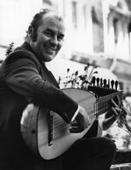 Julian Bream C.B.E. (born July 15, 1933) is a British guitarist and lutenist and is one of the most distinguished classical guitarists of the 20th century. He has also been successful in renewing popular interest in the Renaissance lute. Julian Bream C.B.E. (born July 15, 1933) is a British guitarist and lutenist and is one of the most distinguished classical guitarists of the 20th century. He has also been successful in renewing popular interest in the Renaissance lute.
Biography
Bream was born in London and brought up in a musical environment. His father played jazz guitar and the young Bream was impressed by hearing the playing of Django Reinhardt.
Bream began his life-long association with the guitar by strumming along on a small gut-string Spanish guitar at a very young age to dance music on the radio. The president of the Philharmonic Society of Guitars, Dr Boris Perott, gave Bream lessons, while Bream's father became the society librarian, giving Bream access to a large collection of rare music.
On his 11th birthday, Bream was given a classical guitar by his father. He became something of a child prodigy, at 12 winning a junior exhibition award for his piano playing, enabling him to study piano and cello at the Royal College of Music. He made his debut guitar recital at Cheltenham in 1947, aged 13.
He left the Royal College of Music in 1952 and was called up into the army for National Service. He was originally drafted into the Pay Corps, but managed to sign up for the Royal Artillery Band after six months. This required him to be stationed in Woolwich, which allowed him to moonlight regularly with the guitar in London.
After three and a half years in the army, he took any musical jobs that came his way, including background music for radio plays and films. Commercial film, recording session and work for the BBC were important to Bream throughout the 50s and the early 60s.
In the years after national service, Bream pursued a busy career playing around the world, including annual tours in the U.S. and Europe for several years. He played part of a recital at the Wigmore Hall on the lute in 1952 and since has done much to bring music written for the instrument to light. 1960 saw the formation of the Julian Bream Consort, a period-instrument ensemble with Bream as lutenist. The consort led a great revival of interest in the music of the Elizabethan era. His first European tours took place in 1954 and 1955, and were followed by extensive touring in North America (beginning in 1958), the Far East, India, Australia, the Pacific Islands and other parts of the world. Bream performed for the Peabody Mason Concert series in Boston, first solo in 1959, and later with the US debut of the Julian Bream Consort.
In addition to master-classes given in Canada and the USA, Bream has also conducted an international summer school in Wiltshire, England.
Bream has recorded extensively for RCA and EMI Classics. These recordings have won him several awards, including four Grammy Awards, two for Best Chamber Music Performance and two for Best Classical Performance.[2] RCA also released The Ultimate Guitar Collection, a multi-CD set commemorating his birthday in 1993. From the beginning of the 1990's Julian Bream continued his recording career with EMI Classics, featuring music by J.S. Bach, a Concerto album (with the City of Birmingham Symphony Orchestra and Sir Simon Rattle), and discs devoted to contemporary works and guitar sonatas.
In 1984 Bream's arm was seriously injured in a car accident. It cost him great effort to regain his previous technical ability.
Bream's recitals are wide-ranging, including transcriptions from the 17th century, many pieces by Johann Sebastian Bach arranged for guitar, popular Spanish pieces, and contemporary music, much for which he was the inspiration. He has stated that he has been influenced by the styles of Andres Segovia and Francisco Tarrega.
Many composers have worked with Bream, and among those who dedicated pieces to him are Malcolm Arnold, Richard Rodney Bennett, Benjamin Britten, Leo Brouwer, Peter Racine Fricker, Hans Werner Henze, Humphrey Searle, Toru Takemitsu, Michael Tippett and William Walton. Britten's Nocturnal is one of the most famous pieces in the classical guitar repertoire and was written with Bream specifically in mind. It is an unusual set of variations on John Dowland's Come Heavy Sleep (which is played in its original form at the close of the piece).
Bream has also taken part in many collaborations, including work with Peter Pears on Elizabethan music for lute and voice, and three records of guitar duets with John Williams.
Bream's playing can be characterized as virtuosic and highly expressive, with an eye for details, and with strong use of contrasting timbres.
The above, along with his many radio and television appearances, have made Bream an important ambassador for the classical guitar.
A highly successful biographical film, "A Life in the Country", was first shown on BBC TV in 1976. Bream also presented a series of four master-classes guitarists on BBC TV. BBC TV has presented a programme about Julian Bream's life as a concert guitarist. In 1984 he made eight films on location in Spain for Channel 4 exploring historical perspectives of Spanish guitar music.
The 2003 DVD video profile Julian Bream: My Life In Music contains three hours of interview and performance. It has been declared by Graham Wade "the finest film contribution ever to the classic guitar." His series Guitarra! was made for British television and charts a journey across Spain.
Despite his importance as a classical guitarist, however, many of his RCA Records recordings (including the series of 20th century guitar music) are currently out of print.
Bream has stated that even though he had some 'sessions' with Segovia, he never really studied with him — Bream also does not exclusively hold his right-hand fingers at right angles to the strings, but has stated that he uses a less rigid hand position for reasons of tonal variety.
Bream has for over 40 years lived in a Georgian farmhouse at Semley in Wiltshire. |
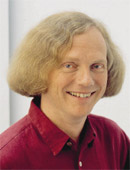 Konrad Junghänel Konrad Junghänel
is a German conductor and lutenist. He has given numerous solo concerts all around the world and has also worked with ensembles such as Les Arts Florissants and others.
In 1987 Konrad Junghänel founded the vocal ensemble Cantus Cölln, which he directs. Numerous recordings of Cantus Cölln have received international recognition. He teaches at the Hochschule für Musik Köln. |
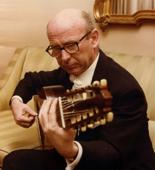 Narciso Yepes Narciso Yepes
(November 14, 1927 – May 3, 1997) was a Spanish guitarist.
Biography
Yepes was born into a family of humble origin in Lorca, Region of Murcia. His father gave him his first guitar when he was four years old. He took his first lessons from Jesus Guevara, in Lorca. Later his family moved to Valencia when the Spanish Civil War started in 1936.
When he was 13, he was accepted to study at the Conservatorio de Valencia with the pianist and composer Vicente Asencio. Here he followed courses in harmony, composition, and performance.
On December 16 1947 he made his Madrid debut, performing Joaquin Rodrigo's Concierto de Aranjuez with Ataulfo Argenta conducting the Spanish National Orchestra. The overwhelming success of this performance brought him renown from critics and public alike. Soon afterwards, he began to tour with Argenta, visiting Switzerland, Italy, Germany and France. During this time he was largely responsible for the growing popularity of the Concierto de Aranjuez.
* Quotes by Angelo Gilardino on the relationship between Argenta and Yepes:
"A very young Narciso Yepes - not yet enlightened by Argenta's lessons, but surely capable of occupying the hot seat with dignity - gave at least one public performance of "Aranjuez" on 1948"
"[...] great Spanish conductor Ataulfo Argenta (1913-1958).[...] He associated Yepes to his project and he taught the guitarist how to perform Aranjuez note by note. Yepes was humble and intelligent enough to do exactly what Argenta had asked him to do. It was only after that historical recording that Aranjuez became a famous piece, and Yepes an even more famous guitarist."
"Argenta played the shapes at the piano and the guitarist absorbed them with his skilfullness."
"I refer to the interpretation of the piece: in order to have the solo part performed with full consistency to his views (and to the orchestra) Argenta took Yepes under a thorough instruction and he was able to get from him the best. I never implied that Yepes couldn't read pieces himself - he had been given basic music instruction by the composer Vicente Asencio, who had added a lot of knowledge to the rather amateurish musical instruction Yepes had got from his former teacher, the guitarist Estanislao Marco."
In 1950, after performing in Paris, he spent a year studying interpretation under the violinist George Enescu, and the pianist Walter Gieseking. He also studied informally with Nadia Boulanger. This was followed by a long period in Italy where he profited from contact with artists of every kind.
In 1952 a song Yepes wrote when he was a young boy became the theme to the film Forbidden Games (Jeux interdits) by Rene Clement. However, the piece, Romance, has often speculatively been attributed to other authors, without conclusive evidence that can stand up to scientific scrutiny, and despite the fact that Yepes confessed to being its composer. If you have a good look at the credits of the movie "Jeux Interdits" however, you will see that Romance is credited as "Traditional: arranged - Narciso Yepes." Yepes also performed other pieces for the "Forbidden Games" soundtrack. His later credits as film composer include the soundtracks to La Fille aux Yeux d'Or (1961) and 'La viuda del capitan Estrada' (1991). He also starred as a musician in the 1967 film version of El amor brujo.
In 1958 he married Marysia Szumlakowska, then a young Polish Philosophy student. They had two sons, Juan de la Cruz (deceased), Ignacio Yepes, an orchestral conductor and flautist, and one daughter, dancer and choreographer Ana Yepes.
In 1964, Yepes performed the Concierto de Aranjuez with the Berlin Philharmonic Orchestra, premiering the ten-string guitar, which he invented in collaboration with the renowned guitar maker Jose Ramirez III[1].
Yepes' 10-string guitar tuning
The instrument made it possible to transcribe works originally written for baroque lute without deleterious transposition of the bass notes. However, the main reason for the invention of this instrument was the addition of string resonators tuned to C, A#, G#, F#, which resulted in the first guitar with truly chromatic string resonance - similar to that of the piano with its sustain/pedal mechanism.
After 1964, Yepes used the ten-string guitar exclusively, touring to all six inhabited continents, performing in recitals as well as with the world's leading orchestras, giving an average of 130 performances each year.
Aside from being a consummate musician, Yepes was also a significant scholar. His research into forgotten manuscripts of the sixteenth and seventeenth centuries resulted in the rediscovery of numerous works for guitar or lute. He was also the first person to record the complete lute works of Bach on period instruments (14-course baroque lute). In addition, through his patient and intensive study of his instrument, Narciso Yepes developed a revolutionary technique and previously unsuspected resources and possibilities.
He was granted many official honours including the Gold Medal for Distinction in Arts, conferred by King Juan Carlos I; membership in the Academy of "Alfonso X el Sabio" and an Honorary Doctorate from the University of Murcia. In 1986 he was awarded the National Music Prize of Spain, and he was elected unanimously to the Real Academia de Bellas Artes de San Fernando[2].
In the 1980s, Yepes formed Trio Yepes with his son Ignacio Yepes on flute and recorder and his daughter Ana dancing her own choreography.
Since 1993, Narcisco Yepes limited his public appearances due to illness. He gave his last concert on March 1 1996, in Santander (Spain).
He died in Murcia in 1997, after a long battle with lymphoma. |
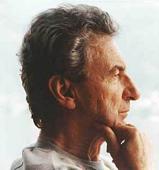 Konrad Ragossnig Konrad Ragossnig
is a classical guitarist and lutenist. He was born in Klagenfurt, Austria, in 1932. He taught at City of Basel Music Academy, University of Music and Performing Arts, Vienna and The University of Zurich. He is editor of several books on guitar music such as "Step by step. Basics of Guitar technique in 60 classical and romantic studies", Mainz 2007 and "Guitar Concert Collection", Mainz 2008.
Konrad Ragossnig was born in 1932 in Klagenfurt, Austria and studied with Professor Karl Scheit in Vienna.
His career began with the first prize award at the 1961 "Concours International de Guitare" in Paris. Since then, concert tours have taken him throughout the world and to prestigious festivals such as Salzburg, Vienna, Ossiach, Hohenems/Feldkirch, Ansbach, Berlin, Schwetzingen, Luxembourg, Festival van Vlaanderen, Paris, Ann Arbor and Osaka, amongst others.
He has made a large number of radio and TV performances and has produced over 60 records and CD recordings for renowned classic labels. Among the many prizes he has been awarded are the "Grand Prix du Disque" and the "Edison Award". |
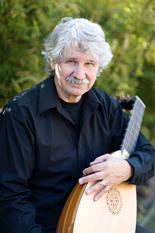 Sarge Gerbode Sarge Gerbode
is a psychiatrist, now retired and living in Sonoma, who has been playing lute since the early 60’s. In his first (1963) performance, he accompanied counter-tenor Alfred Deller. He took a twenty-year break from the lute during his training and practice as a psychiatrist, but resumed lute playing in 1993 and since then has appeared in many different ensembles around the Bay Area. He maintains a web site (gerbode.net) containing editions of over 8000 solo, vocal, and ensemble pieces for lute, including many of his own arrangements and continuo realizations.
My musical career started in Hawaii when I was eleven and some beach boys taught me how to play ukulele. From there, I graduated to baritone ukulele, tenor guitar, then steel-string guitar. In high school, I played rhythm guitar with a big band. In college, I took some classical guitar lessons, but most of the pieces I loved were transcriptions of lute music, so I finally decided to play them on the original instrument. While at Cambridge University studying philosophy, I encountered Ian Harwood, then as now head of the English Lute Society. He provided a ten-page pamphlet by Diana Poulton from which I learned how to play the lute. Ian Harwood also built a lute for me, which I played enthusiastically. My earliest gig, when I'd only been playing for a few months, was a performance at Stanford accompanying Alfred Deller, the famed counter-tenor.
In 1963, I was offered a position with the New York Pro Musica as a full-time lutenist, but instead decided it would be more practical to go to medical school. There followed a twenty-year hiatus, during which I played very little lute. In 1993, I took up the lute again and it has remained a passion for me to this day.
During the last several years, now that I am retired as a psychiatrist, I have been involved in a project to collect as much lute music as I can and make it widely available on the internet. I remember how difficult it was for me to find lute music, and I want to make it easier for others.
For very good reasons, the lute was for hundreds of years the most popular instrument in the western world, and it is past time for it to make a major comeback. I would like to be a part of that comeback, because I feel the lute has much to teach the world about gentleness, subtlety, intelligence and beauty. |
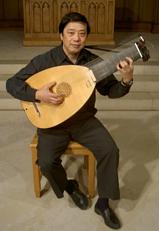 Yasunori Imamura Yasunori Imamura
was born in Osaka, Japan. He studied lute with Eugen Dombois and Hopkinson Smith at the Schola Cantorum in Basel, where he received his soloist’s diploma in 1981. Subsequently, he worked on interpretation and bass continuo with Ton Koopman and Johann Sonnleitner and composition with Wolfgang Neininger.
Today, Imamura is recognised as one of the prominent figures of the lute, both as leading soloists and continuo-players on the lute. He has appeared at numerous international festivals in Europe and the Far East.
The following solo recordings by Yasunori Imamura have appeared so far :
-Simone Molinaro / Complete Fantasias (Deutsche Harmonia Mundi)
-Johann Sebastian Bach / Complete Works for Lute Vol. 1 (Etcetera)
-Johann Sebastian Bach / Complete Works for Lute Vol. 2 (Etcetera)
-Robert de Visee / Pieces de theorbe, Suite in G & A-Major, e & c-Minor etc.(Capriccio)
-Silvius Leopold Weiss / Lute Sonatas, in C Major, A-Major etc. (Capriccio)
-Silvius Leopold Weiss / Lute Sonatas, in Bflat-Major, a-Minor etc. Vol.1 (Claves)
-Silvius Leopold Weiss / Lute Sonatas, in D-Major, g-Minor etc. Vol.2 (Claves)
These recordings have also received excellent reviews in various audio magazines. Especially Lute Sonatas Vol.1 by Weiss (Claves) was awarded the “Diapason d’Or” prize by French Diapason Magazine in July-August 2006 and Lute Sonatas Vol.2 by Weiss (Claves) was awarded the “Le Joker de Crescendo” prize by Belgian Crescendo Magazine in September-October 2008.
Besides his activities as a solist, Yasunori Imamura has collaborated as continuo player with various well-known artists including Cecilia Bartoli, Teresa Berganza, Gerard Lesne, Marc Minkowski, Ton Koopman, Jos van Immerseel, William Christie, Philippe Herreweghe, Michael Schneider, Martin Gester, Maurice Steger, Max Emanuel Cencic, Masaaki Suzuki, Christophe Rousset, Paul Goodwin and Alan Curtis. He has recorded ca. 120 LPs and CDs for Deutsche Grammophon (Archiv-Production), Deutsche Harmonia Mundi, Harmonia Mundi France, Erato, Philips, Decca, Virgin Classics, Capriccio, Etcetera, Claves, Accord, Adda, OPUS 111, Ades, CPO Osnabruck, Astree, Denon, Fnac Music, Pan Classics, Zig-Zag Territoires, DRC and Symphonia.
He is professor for lute at the Conservatoire National de Region de Strasbourg as well as at the Hochschule fur Musik und Darstellende Kunst, Frankfurt am Main. He also regularly gives a number of master classes in Europe and the Far East.
He is a member of La Stagione, Frankfurt (dir. Michael Schneider), Les Musiciens du Louvre (dir. Marc Minkowski), Le Parlement de Musique (dir. Martin Gester), and Camerata Koln.
“Fons Musicae”, performing throughout Europe and the Far East. To date they have made five recordings (Michel Lambert, Giovanni Bononcini, Agostino Steffani, Antonio Caldara and Francesco Gasparini) that have earned various international awards such as the « CLASSICA »(Classica magazine) or the « Sterne des Monats » (Fono Forum Magazine). |
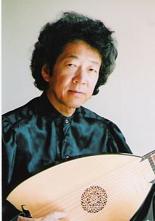 Toyohiko Satoh Toyohiko Satoh
(Lute, Arranger)
Born: 1943 - Japan
The Japanese lutenist, Toyohiko Satoh, studied Rikkyo University in Tokyo - music history with Tatsuo Minagawa, and guitar with Kazuhito Ohosawa. His first guitar recital was performed at the Tokyo Bunka-Kaikan in 1965. He also studied cello and musicology, began his study of the lute, and studied composition with Kure Yasush. In 1968 he came to Europe to study the lute with Eugen Muller Dombois at the Schola Cantorum Basiliensis in Basel, Switserland.
Toyohiko Satoh is probably the best known of presently performing "authentic" lutenists - those who have studied and adopted historical concepts, instruments and techniques. His formal debut at the Carnegie Recital Hall in New York in 1982 received quite a favorable review in The New York Times. As soloist as well as basso continuo player, he has performed in many festivals such as the Vienna Musikwochen, Holland Festival, Toronto Festival, Lisbon Festival, and the Flanders Festival. He has toured extensively in Europe, and throughout Canada, USA and Japan. Besides the Baroque lute, he plays renaissance lute and other related instruments such as the theorbo and chitarrone.
Since 1970, when he made the first solo baroque lute album (for Philips ?), Toyohiko Satoh has recorded extensively for Philips, Telefunken, EMI, Harlekijn and other companies, and since 1990 for Channel Classics for the new CD series. His ensemble recordings with such noted musicians as Frans Bruggen, Gustav Leonhardt, Nikolaus Harnoncourt and Elly Ameling brought consistent honours and awards. His album "Pathodia Sacra et Profana" by Constantijn Huygens, played by Elly Ameling, Max Egmond and two other instrumentalists, won the Edison Prize.
Toyohiko Satoh has been active as a composer since 1981 and has performed his compositions in festivals in the USA, Portugal, Holland and Japan. Two CD's with his own compositions performed with his group Alba Musica Kyo have been released on the Channel Classics label. With that group he also performs medieval, Renaissance and early Baroque music as well as contemporary music of other composers. Some of his compositions and his Method for the Baroque Lute are published by Tree Edition in Germany and Academia Music in Japan.
Toyohiko Satoh held the position of lute professor at the Royal Conservatory in The Hague, Holland from 1973 to 2005 (?). He frequently gives master-classes in various European countries, such as Italy (Accademia Musicale Chigiana in Siena), Germany, the USA, Canada and Japan. Since 2000 he has been the president of the Lute & Early Guitar Society of Japan (LGS-Japan) and the LGS-Europe. |
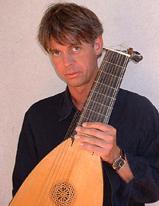 Rolf Lislevand Rolf Lislevand
(Lute)
Born: 1961 - Oslo, Norway
The Norwegian lutenist, Rolf Lislevand, studied the classical guitar at the Norwegian State Academy of Music from 1980 until 1984. In 1984, he entered the Schola Cantorum Basiliensis in Switzerland, which was then the most active early music centre in Europe. He studied there until 1987, under the guidance of Hopkinson Smith and Eugene Dombois. He was then asked by Jordi Savall to accompany him with groups such as Hesperion XX, La Capella Reial de Catalunya and the Concert des Nations.
Through Savall, he acquired first-hand knowledge of 17th century French viola da gamba music, just as Montserrat Figueras introduced him to 16th and 17th century Spanish vocal music.
Since 1987, Rolf Lislevand has been living in Verona, Italy, where he has been trying to reconstruct an authentic way of performing Italian music from the first half of the 17th century. Living in close contact with an old civilization which was always as attentive to modernism as tradition, he strives for a combination of intuition and research to guide him towards a comprehensive concept of style and aestethics of Baroque music.
In the past few years, Rolf Lislevand has expanded two aspects of his career : his work as a soloist ad a teacher. At the Conservatoire National de Toulouse (France), he has been allowed to develop a didactic method for instruments of the lute family which were cut off from their tradition centuries ago. Since 1993, he is a professor at the Staatliche Hochschule fur Musik in Trossingen (Germany). Whereas the apprenticeship in musical academies is often based on teaching stemming from Romantic 19th century tradition, at Trossigen ideals are pursued which are more in accordance with the humanistic concept of man and the artist.
Rolf Lislevand's solo-recordings are released by the French label Auvidis/Astree. His first CD of music by the Italian-born lutenist Hieronymus Kapsberger received, along with glowing reviews, the French 'Diapason d'Or de l'annee 1994' award. The same year, the Kapsberger CD was voted the 'Best Record of Music before 1650' at the MIDEM international music industry fair in Cannes and, in 1995, 'Critic's choice' of Gramophone. In 2000 The Santiago de Murcia CD was voted the 'Best Record of Music XVII-XVIII° century' at the MIDEM international music industry fair in Cannes and was awarded by the French 'Diapason d'Or de l'annee 2000'. |
|
 Tanedores Tanedores
Vladimir Kaminik - baroque guitar, vihuela, renaissance guitar
EVA Greenberg - transverse flute, castanets, percussion.
Vladimir Kaminik started his musical Education in St Petersburg with Pr. G. Totuiko. While studying early compositions on the classical guitar he became attracted to the idea of performance on historical instruments. Combining his musicality with a passion for musicology, Vladimir was the first in Russia to bring the baroque guitar to the stage in a solo concert program in 1998.
.
In the hall of the St. Petersburg Musical instruments Museum he offered a unique presentation of works by Gaspar Sanz, Santiago de Murcia and Robert deVisee, performed on anoriginal instrument using historical tunings. VK is known for his transcriptions for the Baroque guitar & Flute (Duo with Eva Greenberg) and the founder of the "TAĐEDORES" Project.
EVA GREENBERG is a graduate of the St. Petersburg Conservatory and majored in flute. In 1996 she was awarded a diploma at Milano International Flute competition. During her post-graduate studies she encountered the world of early Spanish dance which eventually led her to the study of early music on historical instruments. She mastered early types of flutes and recorders as well as early percussion instruments. |
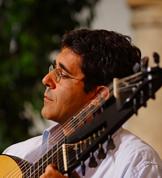 Luciano Contini Luciano Contini
was born in Sassari, Sardinia, in 1958.
After completing his guitar studies with A.Marrosu and O.Ghiglia with awards in various competitions, he began, in the 1980's to dedicate himself to performance practice of renaissance and baroque music, and began playing the lute, exclusively.
From 1982, after graduating cum laude in musicology from the University of Bologna, he continued his studies at the famous Schola Cantorum Basiliensis, Basel, Switzerland, with H.Smith, E.Dombois and J.Christensen.
He began an intense concertistic career which carried him to Europe, the two Americas and Japan, performing for such prestigious institutions as the Gesellschaft der Musikfreunde and the Konzerthaus in Vienna, the Theatre des Champs-Elysees in Paris, the Staatsoper in Berlin and the Teatro alla Scala in Milano with musicians like A. Curtis, B.Dickey, C.Banchini, J.Christensen, R.Clemencic, J.Savall, R.Muti. Along with several radio and television recordings he has participated in numerous productions of compact discs for different labels, as chamber musician and soloist. His solo CD's with music of A.Piccinini and G.Zamboni have been highly recommended by the international critics. L.C. teaches at the University for Music and Performing Arts and at the Private University "Konservatorium Wien" in Vienna. |
 Nigel North Nigel North
was born in London in 1954, and has been playing the lute professionally now for over thirty years. Initially inspired into music at the age of seven by the early 1960s instrumental pop group The Shadows, he studied classical music through the violin and guitar, eventually discovering his real path in life, the lute, when he was fifteen. Basically self taught on the lute, he has developed a unique musical life which embraces activities as a teacher, accompanist, soloist, director and writer. His achievements include the publication of a basso continuo tutor (Faber 1987), representing his work and dedication for this subject, and a four-volume CD recording Bach on the Lute (1994–1997).
Together with Andrew Manze (violin) and John Toll (harpsichord and organ), he formed the ensemble Romanesca, and for ten years, from 1988 to 1998, they explored, performed and recorded seventeenth-century chamber music, winning several international awards for their recordings. Nigel North also enjoys accompanying singers and is an enthusiastic teacher. For over twenty years he was Professor of Lute at the Guildhall School of Music and Drama in London, and from 1993 to 1999 he was Professor at the Hochschule der Kunste, Berlin. Since January 1999 he has been Professor of Lute at the Early Music Institute of Indiana University, Bloomington in the United States, and from January 2005 has also taught the Lute at the Royal Conservatory in The Hague. |
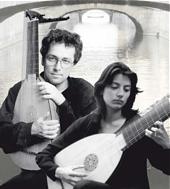 LUTE DUO LUTE DUO
The unique project of Anna Kowalska and Anton Birula
covers a vast repertoire for historical plucked
instruments: lutes, guitars, chitarrone, colascione
and theorbo from the renaissance and baroque to
the late romantic and early XX - th century music.
Anna Kowalska studied lute with Toyohiko Satoh, Nigel North and Joachim Held at the Royal Concervatory in The Hague, The Netherlands. Having been educated as a classical guitarist as well, Anna has covered a vast repertoire from the Renaissance to late Baroque including 19th century repertoire for historical guitar. Her solo programs include mostly works of French and German baroque lute composers such Gaultier, Du Fault, Gallot, Weichenberger, Weiss. Anna pays great attention to solo works of J.S. Bach, including her own transcriptions for baroque lute of sonatas and partitas for solo violin and an unaccompanied cello. As a continuo player she recently worked with Emma Kirkby, Olga Pasiecznik, Wladyslaw Klosiewicz (harpsicord, Poland), Marek Toporowski (harpsichord, "Concerto Polacco", Poland),. Anna is currently concentrating on the lute and baroque guitar as both a soloist and continuo player. Searching for genuine sounding of the of the works of J.S. Bach and S.L. Weiss, Anna recently combines her interpretation with the use of unique technology, playing on purely gut strung instrument as was used in the time of the Baroque.
Anton Birula has studied the lute with Prof. Toyohiko Satoh at the Koninklijk Conservatorium in The Hague and with Prof. Konrad Junghaenel at the Hochschule fur Musik in Cologne. With his concentration on the extant solo literature for the Baroque lute Anton Birula has performed numerous lute recitals featuring music of J.S.Bach, S.L. Weiss and French lutenists. His special interests were transcriptions of J.S. Bach suites for solo cello and violin sonatas and partitas for the Baroque lute. As a theorbo player Anton Birula has performed a vast amount of musical literature with numerous ensembles, specializing in vocal music by 17th century Italian and English composers and the viola da gamba music of Marin Marais and Antoine Forqueray.
Anton has worked with such important soloists as Wladyslaw Klosiewicz (harpsichord), Nigel Kennedy (violin), Emma Kirkby (soprano), Marek Toporowski (harpsichord), Olga Pasiecznik (soprano).
During his long engagement at the Warsaw Chamber Opera Anton has participated in the performances of all works of Claudio Monteverdi as well as operas by Pieri, Caccini, Landi, Scarlatti.
Anton teaches lute at the Frederich Chopin Music Collage (Warsaw) and at the Felix Nowowiejski Music Academy (Bydgoszcz).
As an ensemble
Anna and Anton have come together to attract attention to the long neglected duo repertoire for the Baroque lute duo. United by a mutual fascination they wanted to help shed light upon music which was written during the final twilight hours of the lute's bright history. They were the first to perform and record the recently discovered duet compositions of Francois du Fault and transcriptions of the Marin Marais' duet viola da gamba compositions for two baroque lutes. This resulted in a program «Baroque Lute Duets" which was released on CD in 2002. Later they started to work on duo repertoire for other combinations of historical plucked instruments, especially baroque guitar and theorbo. Showcasing the contrasting styles of different cultures, the program "Musical voyage across 17-th century Europe" moves us from solemn music of great Italian lute and theorbo players (Allessandro Piccinini and Girolamo Kapsberger) to the temperamental style of the first Spanish guitar virtuosi (Gaspar Sanz and Santiago de Murcia) and melancholic mood of French baroque masters (Robert de Visee and Francois Couperin).
Vast project dedicated to works of Johann Sebastian Bach covers solo works for lute including lute versions of solo violin and cello compositions as well as transcriptions of other instrumental works of the master for two 24 string Baroque lutes.
Recent activity of the duo concerns also 19th century music for romantic guitar. Using copies of 6 string guitars of the 19th century maker Rene Lete, strung with gut strings, the musicians perform works of J.K.Mertz, F. Sor, F. Chopin, Napoleon Coste. The high point of this program is the transcription of the famous organ work by Cesar Frank, Prelude Fugue & Variation, op.18
Anna and Anton successfully presented these programs across Europe performing at different festivals in Austria, Belgium, Chech Republic, France, Germany, Holland, Poland, Russian Federation and Switzerland. |
 Stephen Stubbs Stephen Stubbs
(Lute, Conductor, Arranger)
Born: 1951 - Seattle, Washington, USA
The American lutenist and conductor, Stephen Stubbs, has been engaged in music-making since early childhood. Parallel interests in "early music" and the 20th century avant-garde music led him to study composition and harpsichord at the University of Washington. At the same time, he learned to play keyboard and plucked instruments, specializing in the principal Baroque accompanying instruments, harpsichord and lute. After graduation he completed his study of the lute in Holland and England, where he made his professional debut as lutenist at Wigmore Hall, London in 1976.
By this point, Stephen Stubbs' career in early music - both as an active scholar and a performing musician - was in the ascendant. His research and performing life on the lute, citarrone, and Baroque guitar helped re-establish these plucked continuo instruments within the soundscape of Baroque music. In 1980 he went to Germany, where he played with the Musikalische Compagney, Berlin and Fuiori Musicali, Bremen. Since 1981 he is teaching at the Hochschule fur Kunste, Bremen were he helds now the post as Professor for lute and performance practices. He continued to live in North Germany until 2006, and from there has made extensive tours through Europe and USA.
1987 was a watershed year in Stephen Stubbs' life and in the history of the early music revival. For that year's Bruges Early Music Festival, Stubbs directed a production of Stefano Landi's opera La Morte d'Orfeo. The success of this production launched Stubbs as one of the most called-upon directors of early opera performances, and spun off the highly successful ensemble Tragicomedia. The group at its core consists of Stubbs and two others of the best early continuo players in the world: harpist Andrew Lawrence-King and lirone virtuoso Erin Headley. Together as Tragicomedia, the three have formed the core of major productions of all three surviving operas of Claudio Monteverdi, Francesca Caccini's Ruggiero, Sartorio's L'Orfeo, Stefano Landi's Orfeo, and the opera Orfeo by Luigi Rossi. Their performances have included every major European and American early music festival and have used collaborations with such performers as Paul Hillier and Theatre of Voices, William Christie and Les Arts Florissants, Philippe Herreweghe and La Chapelle Royale, and a new partnership with lutenist Paul O'Dette. The group has toured three continents (Europe, North America and Japan), released over 20 CD's, and received an Edison Award in 1994 for a Monteverdi madrigal program.
In 1996, Stephen Stubbs founded yet another ensemble, the late-Baroque orchestra Teatro Lirico. Their first CD Love and Death in Venice, was released in 1996. Further recordings of the ensemble include Italian 'Cello Concerti with soloist Lucie Swarts and a live recording of Antonio Sartorio's Orfeo of 1672 for Vanguard Classics was awarded the Cini Prize for best opera recording of 1999. Stubbs has been invited to direct opera productions in most European countries, the USA, Canada and Scandinavia, including Monteverdi's Orfeo at the Netherlands Opera in Amsterdam 1997-1998 to be revived in 2007. Most recently he directed Monteverdi's Poppea in Vancouver, Gluck's Orfeo in Bilbao, and Handel's Giulio Cesare in Murcia.
Since 1997 Stephen Stubbs has co-directed the bi-annual Boston Early Music Festival opera. In 2003 he was named permanent artistic co-director of this Festival. He and artistic co-director Paul O'Dette have produced and directed a series of Baroque operas at the Festival beginning in 1997 with Luigi Rossi's Orfeo up to the production of the newly rediscovered Boris Goudenow by Johann Mattheson in 2005. The first recording of such a production was also released in 2005. This world premiere recording of Johann Georg Conradi's Ariadne on BEMF has been greeted with worldwide enthusiasm in the musical press, and was nominated for a Grammy this year.
To cultivate the singers and players of the next generation he founded an early opera course at the Hochschule in Bremen. In 2005 the eighth annual meeting of this intensive week-long workshop called the "Accademia d'Amore" was presented for the first time in Seattle. In 2006 he moved to Seattle where he has established a new graduate school for young singers and players of Baroque music called the Seattle Academy of Baroque Opera.
Stephen Stubbs' solo lute recordings include the music of J.S. Bach, Silvius Leopold Weiss, David Kellner, the Belgian lutenist Jaques St. Luc, Gaultier, Gallot and Logi. A recording of Bach's Luteworks was released in 2003 on the ATMA label where he also appears as the conductor of the Monteverdi Vespers with Tragicomedia and Handel Love Duets with Ensemble Arion. With Baroque harpist Maxine Eilander he also recorded Sonate al Pizzico for ATMA in 2004. In 2006, new Teatro Lirico recordings appeared on the ECM label including Folia, featuring improvisations on Baroque chord patterns and new compositions by Stubbs for the Baroque guitar. Since the inception of the Dowland Project on ECM he has played on all the group's recordings. He has recorded numerous LP's and CD's with famous other ensembles like Hilliard Ensemble or with Andrew Lawrence-King. |
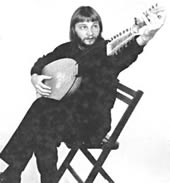 Alexander Suetin Alexander Suetin
- A soloist-luteist Moscow State Philharmonic Society, Honored Artist of Russia.
Born in 1957 in Moscow. In 1978 he graduated from the Music College im.Oktyabrskoy Revolution (now the Academy of Music Shnitke) on guitar. Engaged in research of ancient music, mastered the lute instruments. He finally parted ways with the classical guitar..
Concert activities A. Suetin engaged since 1978, appeared with many famous performers of early music - ensemble "Madrigal", T. Belyakova (soprano), Alexander Lyubimov, T. Grindenko and ensemble The Academy of Ancient Music, and A. Mustonenom Ensemble "Hortus muzikus (Estonia), the trio" Orfarion ", etc.
In addition to the active concertato A. Suetin a lot of time to research and publishing work. He is the author of five handwritten manuscripts for lute under the title "Testudo" miniatures and manuscripts stored in private European collections. |
 Miguel Yisrael Miguel Yisrael
was born in 1973 in Lisbon, where he began his musical and artistic career, earning his Diploma in Classical Guitar in 1994.
From 1999 to 2004, after studying the lute at the Paris Conservatoire, with Claire Antonini, Miguel Yisrael completed his musical education with Hopkinson Smith in Basel, Switzerland, at the Schola Cantorum Basiliensis.
As a soloist, Miguel Yisrael has given recitals in France, Portugal, United Kingdom, Germany, Belgium, Switzerland, China, Canada and the USA.
In 2000, he took part in a television documentary devoted to the lutenist Hopkinson Smith, broadcast by Mezzo, Classica, RTBF and TSR. Miguel Yisrael has recorded 2 solo CDs for the Dutch Label Brilliant Classics, in 2008 and 2010, earning a "Diapason d'Or Découverte" for his CD "The Court of Bayreuth" and a "5 Diapason" for his CD "Les Baricades Mistérieuses". He is also the author of a major treatise on the baroque lute, published in Italy by Ut Orpheus in 2008. In 2010, he created, for the same publisher, a new collection of music scores for the Baroque lute called "La Rhétorique des Dieux".
Miguel Yisrael performs on lutes built by Renzo Salvador, Liège, Belgium.
He currently lives and teaches renaissance and baroque lute in Paris. |
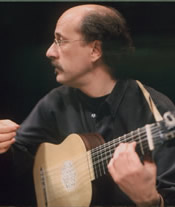 José Miguel Moreno José Miguel Moreno
- vihuela, lutes, theorbo, angelic, baroque and classico-romantic guitar.
José Miguel Moreno was born in Madrid and started studying music at the age of 4. During his period of formation, he won, among others, the First Prize of the Incontri Chitarristici di Garnano (Italy 1977). He specializes in historical interpretation, although his repertoire ranges from XVIth to XXth century. He plays on original instruments, vihuela, Renaissance and baroque guitars, Renaissance and baroque lute, theorbo, romantic guitars, all of them either original instruments or faithful copies. In this field, José Miguel Moreno is recognized worldwide as one of the major specialists nowadays. He has also developped his teaching activities, being invited by the most prestigious universities and Conservatoires in the world. Together with Lourdes Uncilla he researches the historical construction of the instruments of the lute and guitar family.
He has performed in the main festivals and musical halls of Europe, Australia, North and South America and Asia, such as Wiener Musik Verein, Wiener Konzerthaus, Granada International Music Festival, Flanders Festival, Theatre des Champs Elysees, Teatro Real of Madrid, Auditorio Nacional Madrid, Cemal Resit Rey Concert Hall in Istambul, Brisbane Biennal, Wigmore Hall of London, Puchkin Hall in Moscow, Metropolitan Museum of New York, La Habana (Cuba), Tokyo (Hokutopia Festival), Bruges Festival in Belgium, Barcelona, Utrecht, Insbruck, Escorial, Paris, Bruxelles, Berlin, Munich, Leipzig, Prague, etc... etc.... For several years, Jose Miguel Moreno collaborated with Teresa Berganza and recorded for Philipps with the renowned mezzo. He has also undertaken tours and recordings with HESPERION XX and Jordi Savall. Among those:áLachrimaes of John Dowland for lute and viola.
In 1990 he founded the ensemble LA ROMANESCA, dedicated to the interpretation of Spanish and European baroque music and in 1998 he founds ORPHENICA LYRA.áTheir first CD of this ensemble released in June 1999 is a tribute to Fuenllana, the blind Spanish Renaissance composer and his master work: Orphenica Lyra.áThe second one was released in December 2000 dedicated a to the Spanish baroque composer:áGaspar Sanz. Jose Miguel has dedicated a CD to John Dowland, with Eligio Quinteiro in duets. (Dowland Semper) and one dedicated to Luis de Millan.áThe following wasádedicated to Don Quixote.áThe next cd to be launched will be dedicated to J.S.Bach.
Jose Miguel Moreno has interpreted, recently in Belgium (Bruges, Antwerp and Brussels) the Fantasia para un gentilhombre of Joaquin Rodrigo for guitar and orchestra with the Flandes Symphonical Orchestra.
Jose Miguel Moreno has recorded for Philipps, Emi, GLOSSA, Deutsche Harmonia Mundi and Astree Auvidis. At the moment he records with GLOSSA.
Through his record career Jose Miguel Moreno has received many distinctions as Choc du Monde de la Musique, Diapason d`Or, 10 of repertoire, Editor`s choice of Gramophone, CD compact prizes, Fanfare want list, CD compact prizes, Ritmo, Goldberg 5 stars, International prize of Fondaziones Giorgio Cini de Venezia etc. |
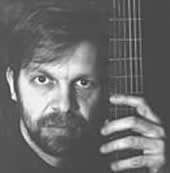 Andrei Krylov Andrei Krylov
started guitar studies in St.Petersburg, Russia at the age of 11. He graduated from Music School (Guitar), State Music College (Guitar, Orchestra Conductor) in St.Petersburg, Peoples University (Music Arrangement) in Moscow. In 1980's-90's he worked as a classical guitar teacher and performer (Russian State Concert Company "Lenconcert") and he has played with the St. Petersburg Chamber Orchestra (conductor, Eduard Gustin) and the "Old Petersburg" music theatre. He has given guitar recitals in Russia, Ukraine, Estonia, USA, and Canada. |
 Oleg Timofeyev Oleg Timofeyev
- Guitarist, lutenist, musicologist.
Pioneer in the discovery, promotion, interpretation, and authentic
performance of the repertoire for the 19th- and 20th-century
Russian seven-string guitar. |
|
|
|
Modern
players,
associates |
|
|
|



